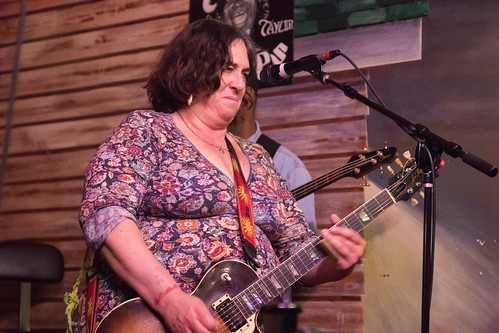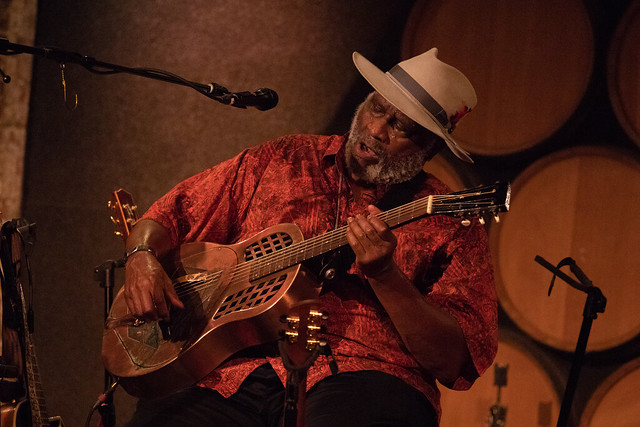JOVM’s William Ruben Helms belatedly celebrates Taj Mahal’s 81st birthday.
Tag: Taj Mahal
New Video: Joanna Connor’s Soulful Cover of Luther Allison’s “Bad News Is Coming”
Joanna Connor is a Brooklyn-born, Worcester, MA-raised, Chicago, IL-based singer/songwriter and guitarist, who has publicly cited her mom (who I’ve actually met) and her mom’s record collection as being a major influence on her life and music. “She listed to blues, folk and rock as much as she could,” Connor recalls on her website. “So I heard Buddy Guy and Taj Mahal when I was kid, and got into the more obscure artists as I went on. And I saw all the Chicago bands, who came through town.” By the time, she was in her mid-teens, Connor was playing the Worcester and Boston club scene with her own band before relocating to Chicago in 1984.
Upon her arrival to Chicago, Connor was mentored by a number of blues legends, sitting in with James Cotton, Buddy Guy and Junior Wells. After a stint in Dion Payton‘s band, Connor went solo with her own band, releasing her full-length debut, 1989’s Believe It, which began a string of critically applauded albums released through Blind Pig Records. Connor’s 2002 effort The Joanna Connor Band found Connor displaying the full extent of her influences as it featured “Different Kind of War” and a funky cover of “Slippin’ Into Darkness.” But just as the buzz and accolades were growing, Connor began a touring hiatus. “There were several factors: 9/11 had just gone down, the economy was changing and clubs were closing. But most of all, my daughter was pretty young at the time. She wound up deciding that she wanted to become a big-time basketball player, so that required dedication on both of our parts,” the Chicago-based singer/songwriter and guitarist explains on her website. That dream has come true: Connor’s daughter was awarded a basketball scholarship at Indiana State University, and Connor has pursued her career with a renewed fervor.
Although Connor wasn’t touring, she discovered that audiences were coming out to see her play renowned Chicago blues club Kingston Mines, where she began playing a weekly, three night residency most weekends, between gigs at larger clubs and festivals. “It’s become kind of an institution: You go to Chicago, you go to Wrigley Field and then you go see Joanna Connor,” the Chicago-based singer/songwriter and guitarist says. “The schedule is kind of brutal, but it’s great—Usually a packed house, with lots of adrenaling pumping. When it gets to be around midnight, the audience starts getting younger. And I love that—My son is 29, and he gets people looking at him and saying, ‘That’s your mom’?” (The schedule is brutal indeed: 3 two hour sets between 7:00pm and 5:00am Fridays and Saturdays — and until 4:00am on Sundays. The nights typically begin with an acoustic blues set, followed by two electric sets, as the crowds get younger.)
The crowds increased even more after a video featuring a live version of “Walkin’ Blues” was posted by a Massachusetts-based fan on YouTube. “It was just a phenomenal thing that happened. I was getting calls from America’s Got Talent and movie people reaching out; I even had a Russian billionaire fly me to Spain to play a birthday party. I think people loved the combination: Here’s a woman who looks like somebody’s mom, and she’s playing like this. What I remember most was that it was 90 degrees that day, so I was wearing the coolest dress I had.”
Connor’s 14th album, the Joe Bonamassa and Josh Smith co-produced 4801 South Indiana Avenue was released last month through Joe Bonamassa’s new blues label Keeping The Blues Alive. Deriving its name from the actual address of hallowed, Chicago blues club Theresa’s Lounge, 4801 South Indiana Avenue was recored at 4801 South Indiana Avenue — and the album finds Connor, Bonamassa, Smith and an impressive array of players digging deeply to conjure an authentic, ass kicking and name taking, non-derivative set of that good ol’ fashioned Chicago blues. “We want the listener to open that door, walk in, and feel to their core some of the magic that a place like that brought night after night. It was an honor to bring this to you, the listener,” Connor says in press notes. “This album is a homage to the blues school that I attended in Chicago,” Connor adds. “We attempted to capture the spirit of tradition and inject it with raw energy and passion.”
Earlier this year, I wrote about the boozy and breakneck boogie woogie “I Feel So Good,” which captures a self-assured woman, who kicks ass, takes names and honestly just wants to have a roaring good time — all while featuring Conor’s blistering guitar work and powerhouse vocals. 4801 South Indiana Avenue’s latest single is a lovingly straightforward, no-frills, no filler and no bullshit rendition of Luther Allison’s haunting wailing blues “Bad News Is Coming.” Much like the original, Connor’s version is full of lived-in, late night heartache and regret — and the recognition that life is often full of incredibly difficult and painful decisions that will change the course of your life and of those you’re involved with.
“This is a Luther Allison song, and we chose it because we were all huge fans of his,” Connor explains in press notes. “I toured with him in Europe for almost ten years as his opening act, so it was an honor to record this haunting piece. Joe came up with the bell idea to further capture the mood.”
Appropriately shot in a Chicago blues club, the video is split between footage of Connor wailing and playing those blues like a heartbroken banshee, brooding in the club’s green room about the decisions she has to made — or already have made. And of course, because it’s a late night blues, we see her packing her gear and leaving the club with an uncertain future ahead of her.
New Video: Ballaké Sissoko Teams up With Rising Gambian Kora Player Sona Jobarteh on a Meditative Single
Ballaké Sissoko is an acclaimed Malian-born, Paris-based kora player. who comes from a rather musical family: Sissoko is the son of equally acclaimed, kora master Djelimady Sissoko, who may be best known for his work with Ensemble Instrumental Du Mali. Drawn to the kora at a very young age, the younger Sissoko was taught the instrument by his father. Tragically,. Djelmady died while his children were very young — and Ballaké stepped up to take the on the role of breadwinner, eventually taking his father’s place in the Ensemble Instrumental Du Mali.
The younger Sissoko has had a long-held fascination with genres and sounds outside of scope of the Mandika people — i.e., flamenco guitar, sitar and others — which, inspired a series of critically applauded collaborations with a diverse and eclectic array of musicians across the globe, including acclaimed French cellist Vincent Segal, Toumani Diabaté, legendary bluesman Taj Mahal and Ludovic Einaudi.
Sissoko’s 11th album Djourou was originally scheduled for release this week — but its release has since been rescheduled for an April 19, 2021 release through his long-time label home Nø Førmat Records. The forthcoming album will feature solo compositions and a number of thoughtful collaborations with a collection of diverse and unexpected artists outside of the Mandinka musical genre for which his griot caste is celebrated globally, including Nouvelle Vague’s Camille, African legend Salif Keita, young, leading female kora player Sona Jobareth, the aforementioned Vincent Segal and Malian-born, French emcee Oxmo Puccino among others.
Interestingly, Djourou, which derives its name from the Bambara word for string, can trace its origins to when Sissoko approached Nø Førmat label head Laurent Bizot with the proposition of blending solo kora pieces with unexpected collaborations. The label and Sissoko mutually agreed that he take the time to confirm enriching and challenging partnership with artists, who were fans of Sissoko’s work. And as a result, the album has taken over two years to complete.
Late last year, I wrote about Djourou’s first single, the meditative and gorgeous “Frotter Les Mains,” which features acclaimed Malian-born, French-based emcee Oxmo Puccino. Deriving its title from the French phrase for “rub hands,” “Frotter Les Mains” is centered around the percussive element of Sissoko rubbing his hands, shimmering kora and Puccino’s dexterous and heady French lyrics. The end result is a song that’s simultaneously a much-needed bit of peace, thoughtfulness and kindness in a world that’s often batshit insane, a vital connection between the ancient and the modern, the West and Africa — and a reminder that hip hop has become the lingua franca that binds us all.
Djourou’s latest single, album title track “Djourou” is a mediative track that sees Sissoko collaborating with leading Gambian-born, female kora player Sona Jobarteh, centered around the duo trading shimming and expressive melodic bursts of kora paired with ethereal, interwoven vocals. Much like its immediate predecessor, the track finds its collaborators making a vital connection — this time across both contemporary African borders and across generations. Sissoko sought out Jobarteh with a specific wish to connect with the younger generation of kora players — to rejoin with their common forebears, to weave a connective thread across borders that were unknown and unimagined to the griots of the Malian Empire’s presence over much of West Africa.
“You grow up listening to somebody, and that’s the person that has in many ways been your teacher, your inspiration since a very young age,” Jobarteh says of her collaboration with the Malian-bor, Parisian-based kora master. “The first time I heard him, sounded so different to me, the tone that he gets out of the instrument is so different. He says something to me, the phrasing and the melody he picks – and he’s technically amazing, but he doesn’t let that become more than the music. That’s something I’ve always respected about him.”
Directed by Benoît Peverelli, the recently released video for “Djourou” features intimately shot footage of Sissoko and Jobarteh in the studio. The visual manages to convey the meditative peace of the song.
New Video: Ballaké Sissoko Teams Up with Oxmo Puccino on a Gorgeous and Meditative New Single
Acclaimed Malian-born, Paris-based kora player Ballaké Sissoko is the son of Djelimady Sissoko, a master kora player, best known for playing with the Ensemble Instrumental Du Mali. Drawn to the instrument at a very young age, the younger Sissoko was taught by his father. Tragically, Djelmady died while his children was very young — and Ballaké stepped up to take on the role of the family breadwinner and took his father’s place in the Ensemble Instrumental Du Mali.
A long-held fascination with genres and sounds outside of the scope of the Mandinka people’s scope – – i.e., flamenco guitar and sitar — inspired a series of critically applauded collaborations with a diverse and eclectic array of musicians across the globe, including a acclaimed French cellist Vincent Segal, Toumani Diabaté, legendary bluesman Taj Mahal and Ludovic Einaudi.
Slated for a February 19, 2021 release through Nø Førmat Records, Sissoko’s 11th full-length album Djourou will feature solo compositions and a number of thoughtful collaborations with diverse and unexpected artists outside of Mandinka musical genre for which his griot caste is celebrated — and the list of collaborators include Nouvelle Vague’s Camille, African legend Salif Keita, leading female kora player Sona Jobareth, the aforementioned Vincent Segal and Malian-born, French emcee Oxmo Puccino among others.
Djourou, which derives its name from the Bambara word for string, can trace its origins to when Sissoko approached Nø Førmat label head Laurent BIzot with the proposition of blending solo kora pieces with unexpected collaborations. With a mutual emphasis between the artist and the label, that they take he time to confirm enriching and challenging partnerships with artists, who were also fans of Sissoko’s work, Djourou has been a slow-burn album in the making since 2018.
Djourou’s first single is the mediative “Frotter Les Mains,” featuring acclaimed French emcee Oxmo Puccino. Deriving its name from the French term for “rub hands.” the track mirrors some of the song’s percussive elements that Sissoko created in the studio. Centered around Sissoko’s gorgeously cascading kora chords and Puccino’s dexterous flow, “Frotter Les Mains” is a much-needed bit of peace, thoughtless and kindness in a world gone absolutely batshit. Additionally, the song — in my mind, at least — serves as a vital connection between the ancient and the modern, between the West and Africa, and as a reminder that hip-hop is the lingua franca that binds us all.
Puccino was among the first artists to be recruited for the album. And interestingly, the studio sessions was a personal and professional highlight: he recalls that, he was introduced to Sissoko by Vincent Segal “as an uncle.” Puccino continues, “Life never leaves me alone: it either makes fun of me or it makes me feel so small. This time the staging was perfect. Vincent Segal helped me to take my art to the next level. This day he presented me to Ballaké, who my parents used to listen to when he was playing in Mali’s National Orchestra. I used to dream when Vincent was speaking to me about Bamako and their recording session. I have been waiting for this opportunity and to meet together. When I was invited to take part in the album, I only thought for 2 minutes before finding an obvious theme; the voice of our body, or rather its subtitle: our hands. I’m coming from a lineage of Blacksmiths and Ballaké is descended from a long line of kora players.”
Directed by Julien Borel and Vladimir Cagnolari, the recently released video for “Frotter Les Mains” features intimately and gorgeously shot footage of the duo in the studio.

Live Concert Photography: Sister Sparrow & The Dirty Birds with The Rad Trads and The U.S. Americans at Irving Plaza 12/1/18

Live Concert Photography: BRIC JazzFest at BRIC House Night 3 10/20/18 feat. Kat Edmonson, Brownout Presents “Fear of a Brown Planet,” Deva Mahal, and Freelance

Live Concert Photography: Joanna Connor and Lil’ Ed and The Blues Imperial at Kingston Mines 4/14/18
If you’ve been following JOVM for the past few weeks, you may remember a lengthy post on the legendary Malian griot Kassé Mady Diabaté, who has been recognized during his 50 year career as one of […]

